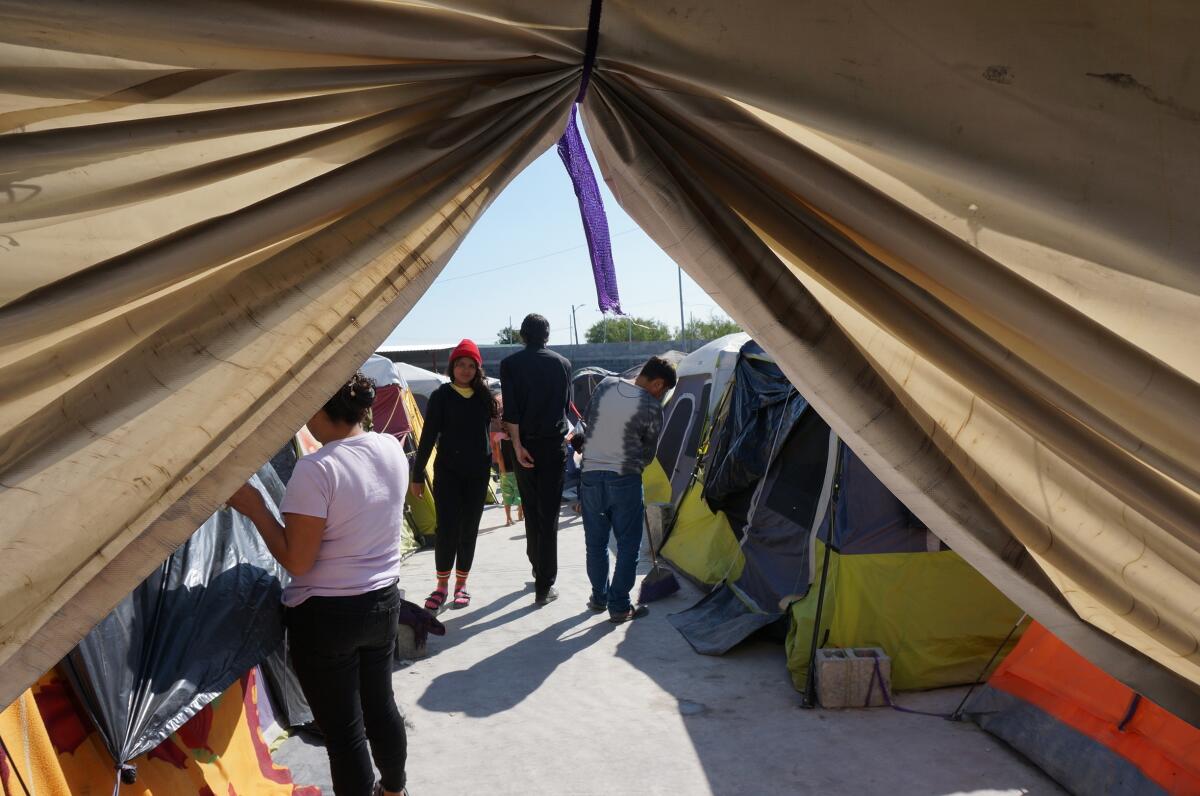Migrants gather in Mexico near U.S. border as Trump asylum restrictions near expiration

- Share via
REYNOSA, Mexico — Thousands of migrants packed shelters on Mexico’s border with the United States on Friday as the end neared for Trump-era asylum restrictions.
Their arrival comes after illegal border crossings of single adults dipped in November, according to a Justice Department court filing released Friday. The filing gave no explanation for last month’s decline, and did not account for families traveling with young children or for children traveling alone.
Would-be asylum seekers are anticipating the end of the U.S. public health rule known as Title 42, which has left some biding time in Mexico. Migrants have been denied the right to seek asylum under U.S. and international law 2.5 million times since March 2020 on the grounds of preventing the spread of COVID-19.
U.S. border cities, most notably El Paso, Texas, are also facing a daily influx of migrants that the Biden administration expects to grow if asylum restrictions are lifted. Republican-led states have asked a federal appeals court to keep Title 42 in place beyond next Wednesday’s scheduled end. A decision could come down to the wire.
Tijuana, the largest Mexican border city, had an estimated 5,000 people staying at more than 30 shelters this week, said Enrique Lucero, the city’s director of migrant affairs.
In Reynosa, Mexico, near McAllen, Texas, nearly 300 migrants — most traveling with family — crammed into the Casa del Migrante, sleeping on bunk beds and even on the floor.
Rose, a 32-year-old from Haiti, has been in the shelter for three weeks with her daughter and 1-year-old son; she did not provide her last name because she fears it could jeopardize her safety and her chances for asylum.
She said she learned on her journey of possible changes to U.S. policies, and was happy to wait a little longer in Mexico for the lifting of restrictions enacted at the outset of the pandemic that have become a cornerstone of U.S. border enforcement.
But she’s worried about making mistakes as she tries to get her family to the U.S.
“We’re very scared,” Rose said, “because the Haitians are deported.”
Inside Senda de Vida 2, opened in Reynosa by an evangelical Christian pastor when his first shelter reached capacity, about 3,000 migrants are living in tents pitched on concrete slabs and rough gravel. Flies swarm everywhere under a hot sun beating down even in mid-December.
For the many fleeing violence or economic hardship in Haiti, Venezuela and elsewhere, such shelters offer at least some safety from the cartels that control passage through the Rio Grande Valley and prey on migrants.
In McAllen, about 100 migrants who avoided asylum restrictions rested on floor mats Thursday in a large hall run by Catholic Charities, waiting for transportation to families and friends across the United States.
Gloria, a 22-year-old from Honduras who is eight months pregnant with her first child, held onto a printed sheet that read: “Please help me. I do not speak English.” Gloria also did not want her last name used out of fears for her safety. She expressed concerns about navigating the airport alone and making it to Florida, where she has a family acquaintance.
Andrea Rudnik, co-founder of an all-volunteer migrant welcome association in Brownsville, Texas, across the border from Matamoros, Mexico, was worried about having winter coats for all of the migrants coming from warmer climates.
“We don’t have enough supplies,” she said Friday, noting that donations to her group, Team Brownsville, have declined.
Title 42, which is part of a 1944 public health law, applies to all nationalities but has fallen unevenly on those whom Mexico allows to reenter if the U.S. turns them away — Guatemalans, Hondurans, Salvadorans and more recently Venezuelans, in addition to Mexicans.
According to Friday’s court filing, U.S. Border Patrol agents stopped single adults 143,903 times along the border with Mexico in November, down 9% from 158,639 stops in October and the lowest level since August. Nicaraguans became the second-largest nationality at the border among single adults after Mexicans, surpassing Cubans.
Single Venezuelan adults were stopped 3,513 times by Border Patrol agents in November, plunging from 14,697 a month earlier — demonstrating the impact of Mexico’s decision on Oct. 12 to accept migrants from the South American country who are expelled from the U.S.
Single Mexican adults were stopped more than any other nationality: 43,504 times, down from 56,088 times in October.
Nicaraguan adults were stopped 27,369 times, up from 16,497. Cuban adults were stopped 24,690 times, up from 20,744.
In a related development, a federal judge in Amarillo, Texas, ruled Thursday that the Biden administration had wrongly ended another Trump-era policy that requires asylum seekers to wait in Mexico for their hearings in U.S. immigration court. The ruling had no immediate effect, but could prove a longer-term setback for the White House.
The Department of Homeland Security said it was evaluating its next steps. Texas Republican Gov. Greg Abbott, who sued to keep the “Remain in Mexico” policy in place, called the ruling a victory “for now.”
“Remain in Mexico,” introduced in January 2019, forced about 70,000 asylum seekers to wait in Mexico for their U.S. hearings. Biden suspended the policy on his first day in office.
Associated Press reporters Elliot Spagat in San Diego and Paul J. Weber in Austin, Texas, contributed to this report.
More to Read
Sign up for Essential California
The most important California stories and recommendations in your inbox every morning.
You may occasionally receive promotional content from the Los Angeles Times.













